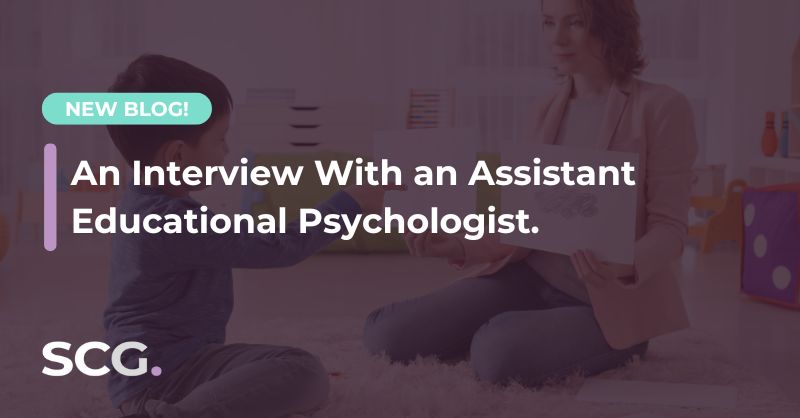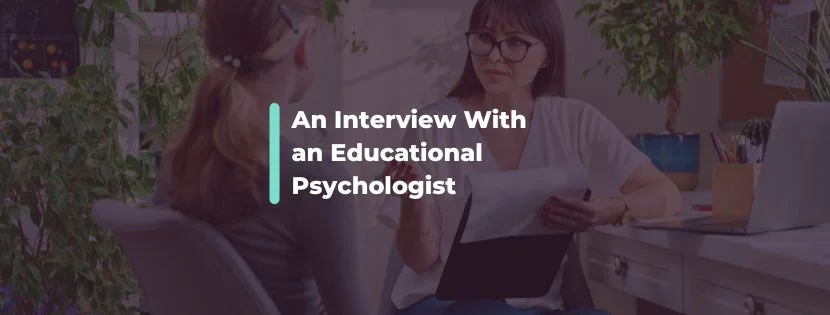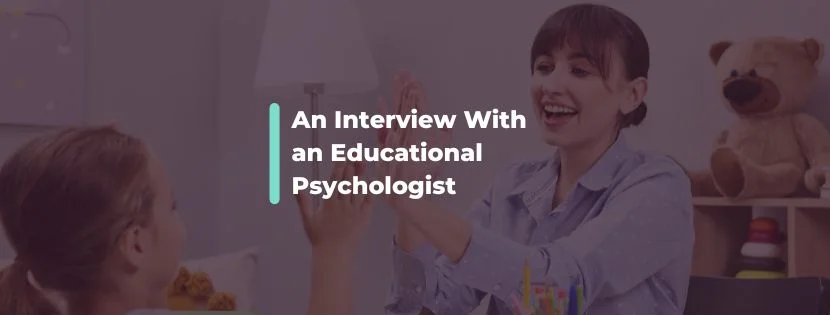Inspiring Practitioners: An Inside Look at an Assistant Educational Psychologists Role
30 Jul, 20241-2 minutes
In this blog, you will learn:
- What it is like to be an Assistant Educational Psychologist.
- How more Assistant Educational Psychologists can help tackle the national shortage of Educational Psychologists.
- How to find and apply for the best Educational Psychologist jobs.
If you’re curious to learn what an Assistant Educational Psychologist does and how they differ from a qualified Educational Psychologist, then you have come to the right place.
Assistant Educational Psychologists work under the supervision of Educational Psychologists helping prioritise the needs of children with SEND, and support parents and schools.
In this exclusive interview with Assistant Educational Psychologist Tia Fitzgerald, we uncover the benefits to working towards a career in educational psychology.
According to the Department for Education, there is little evidence that Assistant Educational Psychologists would have sufficient impact to address the national shortage of Educational Psychologists. Tia disagrees, and has shared with us the benefits to working as an Assistant Educational Psychologist and her plans for the future.
Tell me about your career journey so far
I would love to say that I always knew what I wanted to do, but it’s simply not true. I always knew I loved children and wanted to have a career where I could help them. I started my educational journey as an undergraduate in Education Studies.
During the course, I enjoyed placements in different schools, taught English in Thailand, and loved every second. I decided to follow up with a postgraduate certificate in education (PGCE) in primary education.
When I graduated, I interviewed and was beyond excited to be told I would have my very own Year 5 class. Before I started my teaching career, I wasn’t able to finish my final PGCE placement due to the COVID lockdown.
I loved working with children, building relationships, and making learning fun. Yet teaching is demanding, and with the pressure of attainment demands, working long hours to plan outside of a 35-hour week and then going up against the pressures of the actual job, I felt I wasn’t helping anyone, including myself. By the time I’d completed my Newly Qualified Teacher year, I was burnt out and knew I wanted to change careers.
What inspired you to work in the educational psychology sector?
I was always attempting to improve children’s self-esteem and promote a growth mindset when teaching, so I thought psychology would be a good choice for me, and I enrolled in a conversion Master's in Psychology.
I wasn't naïve as to how difficult this would be when the course leader started our first day by saying, “This will be the toughest year; this is a 3-year course in 1 year.” For me, it was exhilarating to learn and to understand more. This prompted me to look at the future, and I realised I had the qualifications to become an Educational Psychologist. This felt like a career path that would allow me to help children feel seen and supported.
Although I had the qualifications to be an Assistant Educational Psychologist, what I did not have was confidence in the SEN sector. So, I gained as much experience as possible. I did primary supply teaching and 1:1 support work, I volunteered as a youth support worker and I became a pastoral officer in a high school before starting my job as an assistant. As soon as I started, I absolutely loved it.
What does a typical day look like for you?
Every day is different, but some of the tasks are the same. By that, I mean it’s very common to have consultations, write reports, run interventions, and attend supervision, but the cases I’m assigned make the same activities completely different.
A typical day as an assistant looks like the following: At 7am, my alarm goes off and by 8am, I’ve done morning learning activities with my son and had breakfast. I get dressed and walk my son to school and I arrive home in time to open my laptop at 9am.
From 9am till 10am, I usually communicate by email with all the professionals I need to contact for the cases I am handling at that point, including schools to confirm consultation times or review interventions.
At 10am, I drive to a school to either carry out an intervention or have a consultation with Teachers and parents, and complete an observation of a child in their setting.
I arrive home around 1pm and take my lunch, which usually includes some kind of exercise, e.g., gym or swimming. At 2pm, I’m back at my desk at home, finishing work from the previous day or starting to write up my notes.
From 3pm till 5pm, if I’m writing a report, I start to triangulate my data and think about the best route for the case, e.g. actions to suggest to the school or considering which professional I need to contact to gather more information.
As an assistant, I will sometimes be unsure about cases and contact my manager via Teams to discuss the case and what action to take next. At 5pm, I collect my son and usually go to the park on the way home before making dinner.
The rest of my evening includes spending time with my son, either taking him to a sports club or playing with his toys before putting him to bed. I don’t usually revisit work after 5pm. By 8pm, I’m usually in the bath reading a book before bed.
What does your work consist of?
I work with children from birth to age 25. They have varying needs and each has their own individual life experience. It is my job to analyse the data given by a multitude of professionals and then ultimately learn about the children individually in order to support them.
As professionals in the educational psychology sector, we have to develop great communication skills and learn how to handle people’s emotions. We also have to learn to execute plans that will be most beneficial to the child at the centre of each case.
I have to keep psychology in mind at all times and try to think deeper into the data given to me, especially if the child is displaying certain behaviours. I will try to determine what they are trying to communicate by displaying these behaviours.
How does an Assistant Educational Psychologist differ from a qualified Educational Psychologist?
My role definitely differs from a qualified Educational Psychologist, and being an assistant, I am allocated cases in a manageable portion by Educational Psychologists. These professionals help me think through and hypothesise the cases before I see the child, as well as consider the appropriate assessments to carry out. I use a lot of data from Speech and Language Therapists, Occupational Therapists, SENCOs, and Teachers.
This is in comparison to the qualified EPs who are allocated schools, which can mean a high proportion of cases to carry out, as well as attending SEN plan meetings to talk about all children on the school's SEN register, and running training programs.
In my borough, I’m fortunate to be given the opportunity to do a lot of the work that an Educational Psychologist does. I do not know many assistants who get to write EHC plans or carry out consultations with parents and Teachers independently. This role has given me the resources to think like a psychologist while being closely monitored by those already qualified.
What is the most challenging part of being an Assistant Educational Psychologist?
The most challenging part of my role is not having the breadth of experience to know exactly how to deal with the cases given to me at times. Some cases can be highly sensitive, and Educational Psychologists are trained during their PhD to use psychology in consultations to make people feel seen and to encourage a safe space.
I was a Teacher, turned teaching staff, turned assistant, so although I’ve learned a lot from shadowing Educational Psychologists, I can still feel overwhelmed by some situations. I also find that when going into schools, staff would like help immediately, and I understand the pressure, so I want to do my best. Yet, using psychological interventions isn’t a quick fix.
When I leave some settings, I know my advice will take time to be effective, and I find it difficult to leave knowing that the staff and child are in some distress. But I love coming back to review and seeing change, so it’s definitely a good feeling in the end.
How do you keep up to date with changes in the industry?
In my borough, we have a ‘business meeting’ every three weeks. We bring current topics to the discussion to review if and how they will affect our practice. I’m usually in schools where discussions of changes happen frequently. I also have supervision weekly, where any relevant changes will be discussed.
What is the best thing about working as an Assistant Educational Psychologist?
The best thing about my role is getting to see first-hand the Educational Psychologists doing the job that I would love to do. This motivates me to continue on the pathway. I love that I get to work with children during interventions and personalise them so that the children benefit the most from the experience. I get to make a difference in children’s lives, and this was always the aim.
Another rewarding part of being an assistant is seeing families' lives transform. I work closely with parents, and it feels rewarding to be one of the people to hear their stories and advocate for them and their children’s needs.
Why do you think Educational Psychologists are in such high demand?
Personally, I think Educational Psychologists are in high demand for a few reasons. We have to consider the impact that Covid-19 had on children. There are now more reception children who are not school-ready and require extra support.
The lockdowns during the pandemic caused emotional distress and typically trauma presents itself 3 years after an event. Therefore, there are currently high levels of children showing Social Emotional and Mental Health needs and require additional support.
We must also consider the shortage of Educational Psychologists. The Educational Psychology doctorate is highly competitive and offers limited spaces. Therefore, each year there are limited amounts of newly qualified Educational Psychologists, whilst the need for them increases. This results in a higher workload for Educational Psychologists and less time to divide between schools in the United Kingdom.
What do you feel can be done to support pupils with SEND in the classroom?
There could be more emphasis on seeing children as individual children, rather than expectations due to chronological age. Each child has their own experience and sometimes they require additional measures to be put in place to support them with their experience.
I recently received training on a process called ‘Therapeutic Thinking’, it’s a technique some schools in the UK have adopted to ensure schools are creating nurturing environments. Personally, I think if all classrooms adopted therapeutic thinking, it would help students with SEND to regulate their emotions and be supported on their strengths.
I feel that there are certain expectations from some classroom environments that children with SEND can find extremely difficult. I would like to see classrooms embrace the needs of their individual students instead of finding ways for them to meet expectations uncomfortably.
For example, a child may struggle to maintain attention when sitting on the carpet. Sometimes it is more beneficial for a child to stand, use a fidget toy or bounce on a yoga ball and listen/learn content. Small changes like these meet children’s needs and enable learning in an individualised manner.
I understand that sometimes school staff do not feel they have the authority to make these changes that typically do not align with school expectations but it would be lovely to see classrooms normalising these changes to suit their students' needs.
Do you have any advice for someone considering a career in Educational Psychology?
When I was interviewed for my current position, I asked my principal what her advice would be for me to be successful as an assistant. She replied ‘learn as much as you can’. This was the best and most accurate advice I’ve received and have continued to tell people who wish to join the psychology sector.
Becoming an Educational Psychologist is a journey and everyone in the sector comes from different backgrounds. Every individual is respected for their individual pathway into the role, so don’t ever feel that your experience is not valid.
If you’re finishing your studies, my main piece of advice is to get as much experience working with children as you can. The minimum requirement is 2 years-experience, but I have personally felt having a multitude of experience from different settings was beneficial for me even if it wasn’t necessary. It is good to have exposure to different agencies and ways of working to cultivate your own positive ethos when working with children.
At times it’s difficult but try to not become deterred by the process, psychology is competitive but the journey and all that you learn along the way is worth it. Try to have confidence in what you have learnt, whether it’s in your studies or in different roles and apply for any opportunities that make you feel excited. As long as you meet the minimum requirements, go for it and enjoy every minute.
What are your plans for the future? What do you hope to achieve?
I will be beginning my last step to becoming an Educational Psychologist in September when I start my Educational Psychology Doctorate. I hope to gain as much experience as I can as a trainee in a range of areas, working on different types of cases. I hope to work with as many children, families and schools to make the largest impact.
In my career after I’ve completed my training, I want to specialise in trauma in children, especially focusing on children who have experienced domestic violence. I would love to run training in schools for educators to be able to notice the signs and provide assistance that will be beneficial to their lived experience.
SCG educational psychology report
As specialists in SEND recruitment, we work alongside hundreds of Educational Psychologists throughout the UK and are mindful of the challenges they face in their ever evolving role.
After commissioning our own research from Educational Psychologists in both local authorities and private practice, we published the SCG Educational Psychology Workforce Insights Report 2024.
The report delves into trends within educational psychology, funding and resources, industry challenges, policies and legislation and the future of educational psychology.
Read the SCG Educational Psychology Workforce Insights Report 2024 here.
Educational Psychologist jobs
If you’re searching for your next Educational Psychologist job, why not take a look at the latest vacancies, or simply upload your CV to be notified when a relevant position becomes available.
If you’re learning the ropes, check out our interview with a Trainee Educational Psychologist. Discover how to rise up the ranks from trainee to expert in our interview with a Senior Educational Psychologist or even our interview with a Principal Educational Psychologist, where he shares his wisdom and advice for aspiring Educational Psychologists.
Struggling to recruit Educational Psychologists?
As specialist local authority SEND recruiters, we support local authorities nationwide with their temporary, interim and permanent staffing needs.
If you’re struggling to recruit, we have exclusive access to some of the most experienced interim Educational Psychologists in the UK.
Simply contact Natalie Boaler on 01772 954200 to discover how we can help.
Discover more in this interview with educational psychologist and medical professionals recruitment specialist Natalie Boaler.
Share your experience
Every individual brings a unique set of experiences, thoughts, and insights to the table. We believe in giving a voice to a community of professionals to inspire positive change and champion reform in the healthcare sector.
If you work in the healthcare sector and would like to share your own personal and professional experiences, we’d love to hear from you. Perhaps you have a different perspective, could offer a fresh angle, or want to challenge assumptions.
Simply reach out to our Head of Content, Nicole Sherwood, to discuss a collaboration which makes your voice count.
Who is Spencer Clarke Group?
Established in 2017, we’re a vibrant and progressive recruitment agency based in the heart of the North West.
We continually reimagine the recruitment process to challenge convention and defy expectations; from creating a better recruitment experience to remodelling employee engagement, we thrive off doing things differently and turning heads along the way.
We operate in two sectors:
In eleven specialisms:
Healthcare, Social Care & Nursing
Corporate Functions & Business Support






